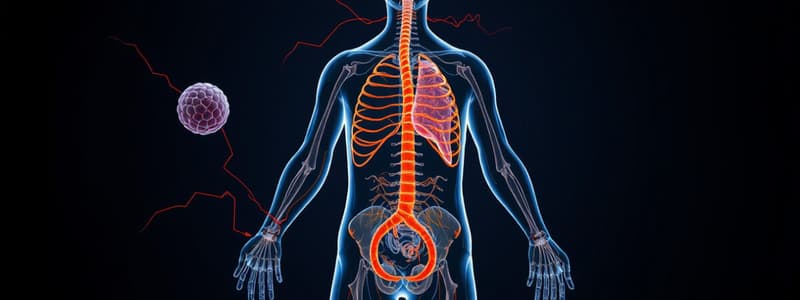Podcast
Questions and Answers
Which of these options correctly lists the 6 basic life processes?
Which of these options correctly lists the 6 basic life processes?
- Metabolism, Responsiveness, Movement, Growth, Differentiation, Reproduction (correct)
- Differentiation, Evolution, Metabolism, Sensitivity, Growth, Homeostasis
- Respiration, Reproduction, Digestion, Excretion, Movement, Growth
- Adaptation, Metabolism, Healing, Growth, Movement, Reproduction
What is metabolism?
What is metabolism?
Builds up or breaks down materials
What does responsiveness refer to in the human body?
What does responsiveness refer to in the human body?
Ability to sense changes taking place inside or outside the body
What is meant by movement?
What is meant by movement?
Define growth in terms of basic life processes.
Define growth in terms of basic life processes.
What is differentiation?
What is differentiation?
What does reproduction involve in biological processes?
What does reproduction involve in biological processes?
Flashcards are hidden until you start studying
Study Notes
Basic Life Processes of the Human Body
- Six fundamental life processes: metabolism, responsiveness, movement, growth, differentiation, reproduction.
Metabolism
- Involves chemical reactions that build up (anabolism) or break down (catabolism) substances.
Responsiveness
- Refers to the body's ability to detect and respond to internal and external changes, ensuring survival and adaptation.
Movement
- Encompasses all forms of motion, including locomotion of the whole body and movements within systems such as the circulatory and respiratory systems.
Growth
- Involves an increase in body size as well as an increase in the size and number of existing cells, contributing to overall development.
Differentiation
- The process through which unspecialized cells develop into specialized cells with distinct structures and functions, essential for complex organisms.
Reproduction
- Involves the creation of new cells for tissue growth, repair, or replacement, and also includes the production of new individual organisms, ensuring species continuity.
Studying That Suits You
Use AI to generate personalized quizzes and flashcards to suit your learning preferences.




